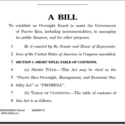Speaker Paul Ryan set March 31 as the deadline for a plan from Congress to solve Puerto Rico’s debt crisis. There were a number of hearings held to make sure that the members of Congress fully understood the issues, and witnesses at those hearings listed quite a few things they thought were important to such a plan:
- A fiscal oversight board of neutral, impartial finance experts was one of the most common suggestions.
- A way to restructure Puerto Rico’s debt, whether by using chapter 9 of the U.S. bankruptcy law or by some other means, was described as essential by representatives of the U.S. Treasury and of Puerto Rico.
- Resolution of Puerto Rico’s status was mentioned in the hearings, and in the media, since Puerto Rico’s unequal status is among the causes of the Island’s fiscal problems.
- Specific options like exemption from the Jones Act or access to the Earned Income Tax Credit were also discussed.
- A plan for economic growth was often mentioned, in hopes of preventing repetition of Puerto Rico’s financial problems.
Pedro Pierluisi, Puerto Rico’s Resident Commissioner, specified his requirements for the plan:
First, it must establish a reasonable process that encourages fair and equitable debt restructuring agreements to be reached between bond-issuing entities in Puerto Rico and their creditors, and then enables those agreements to be enforced in a court of law. Second, it must establish a reasonable oversight board that has the authority to supervise, but not to command and control, the Puerto Rico government. If these two criteria are met, the bill can become law. If they are not met, the bill will not become law. And, if a bill does not become law, Puerto Rico and its creditors will almost certainly go over a cliff—together—this summer.
The White House also had requirements for the plan, which included access to chapter 9 protection, equality in Medicaid and Medicare funding, inclusion in EITC, and strong oversight.
Under the leadership of Rob Bishop of Utah, the members of Congress involved got their draft bill together just time to meet the deadline. The “Puerto Rico Oversight, Management, and Economic Stability Act” (PROMESA) is a discussion bill, and a more formal draft will be released next week. There will be a public hearing on the bill on Wednesday, April 13.
Some of the main features of the bill:
- A five-member oversight board, not under control of the Governor of Puerto Rico nor the Legislature, will be appointed by the President of the United States.
- At least two members of the board must live or do business in Puerto Rico.
- The government of Puerto Rico must submit budgets to the oversight board.
- The oversight board will assist with the process of working with creditors.
- There will also be a Revitalization Coordinator, who will oversee projects intended to improve the economic position of Puerto Rico, including energy projects.
- The board will stay in place until Puerto Rico has had five years of balanced budgets.
- The board will make recommendations to the government of Puerto Rico, but also has the authority to implement changes directly if Puerto Rico does not act on its recommendations.
The bill does not include exemptions from the Jones Act, nor access to chapter 9, it opens the possibility of a reduced minimum wage for Puerto Rico, and leaders in Puerto Rico are complaining about the level of power the board might have over the territory. However, there is room for change before the bill reaches its final form.
“I intend to work constructively over the coming days, with my Republican and Democratic colleagues, especially Chairman Bishop, to get this bill into a position where it can become law,” Pierluisi said. “That is what every responsible leader in Puerto Rico should be doing, rather than simply ignoring the good provisions and complaining about the bad provisions.”
Section 408 of the bill says, “Nothing in this Act shall be interpreted to restrict Puerto Rico’s rights to determine its future political status, including by conducting the plebiscite as authorized by Public Law 113–76.” This is the federally-sponsored referendum which Governor Garcia Padilla promised to implement this year.








2 Responses
[…] PROMESA the same as bankruptcy? Mayer also held that PROMESA is essentially the same as chapter 9, part of the U.S. bankruptcy code which doesn’t apply to […]
[…] recent Energy and Finance Report claims that the passage of PROMESA has revived renewable energy deals that have been languishing on the back burner. “The […]